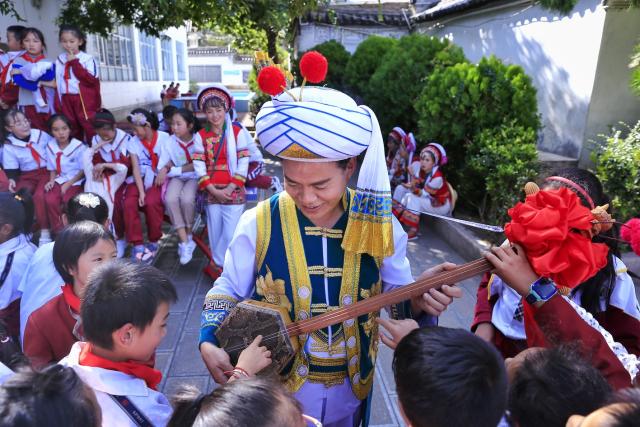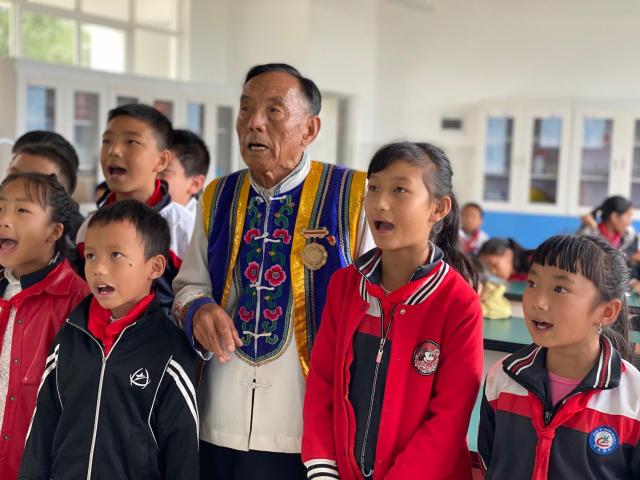
Xizhou: Father and son revive Bai ethnic Daben ballad
The news was updated on January 15, 2020.
“Wooden beams, pillars and rafters; wooden doors, windows and floor slabs; wooden houses easily catch fire, so the owners must not be careless…” Zhao Fukun sang, accompanied by a three-stringed instrument. He was wearing the traditional costume of the Bai ethnic group and singing a song about fire safety.

Living in Xizhou, Dali Bai Autonomous Prefecture, Zhao Fukun has adapted many other Bai ethnic Daben ballads. By combining fashionable contents with traditional tunes, he has blazed a path for passing on the singing and story-telling art of the Bai ethnic group.
“Daben ballads are unique to the Bai ethnic group,” Zhao Fukun said. “The balladeers tell stories in the Chinese language and sing in the Bai language.”
“I can adapt the Daben ballads because of my father Zhao Piding,” said Zhao Fukun. Modern media such as television and the internet have had a huge impact on Daben ballads, so he and his father had to think of a way to preserve this folk art.

In their village, government notifications and policies were often read out in the Chinese language, which was not well understood by the villagers. To solve the problem, Zhao Piding and his son began to convert some notifications and policies into Daben ballads. In 2016, when Dali City was trying to curb the pollution of Erhai Lake, Zhao Piding created two new Daben ballads, titled Erhai Lake of the Past and Protecting Erhai Lake, which soon became popular among the villagers.
The Bai ethnic group traditionally celebrates the Gwer Sa La Festival with Daben ballads. In 2008, after this festival became a Chinese national intangible cultural heritage, Zhao Piding was designated as its representative successor.
Source from http://english.yunnan.cn/html/2020/ethnics_0115/18645.html

 7 Days GolfingTour
7 Days GolfingTour
 8 Days Group Tour
8 Days Group Tour
 8 Days Yunnan Tour
8 Days Yunnan Tour
 7 Days Shangri La Hiking
7 Days Shangri La Hiking
 11 Days Yunnan Tour
11 Days Yunnan Tour
 6 Days Yuanyang Terraces
6 Days Yuanyang Terraces
 11 Days Yunnan Tour
11 Days Yunnan Tour
 8 Days South Yunnan
8 Days South Yunnan
 7 Days Tea Tour
7 Days Tea Tour
 8 Days Muslim Tour
8 Days Muslim Tour
 12 Days Self-Driving
12 Days Self-Driving
 4 Days Haba Climbing
4 Days Haba Climbing
 Tiger Leaping Gorge
Tiger Leaping Gorge
 Stone Forest
Stone Forest
 Yunnan-Tibet
Yunnan-Tibet
 Hani Rice Terraces
Hani Rice Terraces
 Kunming
Kunming
 Lijiang
Lijiang
 Shangri-la
Shangri-la
 Dali
Dali
 XishuangBanna
XishuangBanna
 Honghe
Honghe
 Kunming
Kunming
 Lijiang
Lijiang
 Shangri-la
Shangri-la
 Yuanyang Rice Terraces
Yuanyang Rice Terraces
 Nujiang
Nujiang
 XishuangBanna
XishuangBanna
 Spring City Golf
Spring City Golf
 Snow Mountain Golf
Snow Mountain Golf
 Stone Mountain Golf
Stone Mountain Golf















